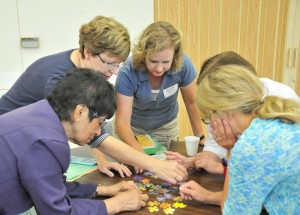By Lindsay Steele
The Catholic Messenger
MOUNT PLEASANT — Parish ministry formation leaders from throughout the Davenport Diocese struggled to assemble small jigsaw puzzles at their round tables, claiming that facilitator Rich Curran had not given them the correct pieces to assemble the puzzle. Their eyes were opened when he revealed that the jigsaw puzzles, just like the puzzles of parish ministry, were meant to be solved collectively. “We are ‘inculturated’ to think that all we need is right here in our parish, but are you 80 parishes or are you one parish with 80 sites?” Curran asked.

Parish ministry leaders, from left, Sister Irene Munoz of St. Mary of the Visitation Parish in Ottumwa, Patty Erusha of St. Mary Parish in Solon, Jennifer Wemhoff of Our Lady of Victory Parish in Davenport, Pat Phillips of Ss. Mary & Mathias Parish in Muscatine and Kathy Brown of St. Mary Parish in Albia assemble a puzzle during a team-building exercise at the August Institute.
The puzzle challenge set the tone for the Challenges of Parish Ministry Today seminar Aug. 22 at St. Alphonsus Church, and served as a follow-up to the June institute. Curran, founder of Parish Success Group, encouraged camaraderie among parishes in solving problems and looking for new ways to increase evangelization efforts and engage parishioners.
To facilitate this idea, Curran first asked the ministry formation leaders to share with other parishes what they had worked on since the last institute day. Some parish representatives said they wanted to wait until fall before fully discussing new ideas, while others spent the summer making extensive changes to ministry. For example, ministers from St. Mary Parish in Solon changed some of their religious education classes to Sunday mornings in order to encourage families to attend Mass together.
Curran continued a discussion from the June Institute about being more evangelical during a time in history when God seems to be less important than things like sports and technology. Curran said motivation is essential to attracting and engaging parishioners and that motivation is directly tied in with emotions. Asking adults to share their faith stories, teaching children to share their faith stories, and encouraging parishioners to participate in encounter experiences such as mission trips can help foster a passion for faith and parish involvement.
The attendees learned how to form a solid team of volunteers, which Curran described as the “face of the Church.” He explained that casting a wide net is not as effective as getting to know parishioners, knowing their strengths, and figuring out good uses for those strengths before asking them to volunteer. He also explained that if a volunteer has a toxic presence, parish ministers should address the matter instead of ignoring it.
Curran and the attendees also discussed the effectiveness of having an online presence. He said most people under 35 years old will go to a church’s website before they go to that church in person. He said having front-page content that demonstrates an active community, with pictures and video, is most attractive to this demographic. “They want to find out what the parish life is like. They are checking you out. …Faces matter, people matter, relationships matter.”
The parish ministers discussed the effectiveness of bulletins. Curran said older parishioners are most likely to rely on the bulletin for information, but younger parishioners generally throw them away. Mike Linnenbrink of St. Boniface Parish in Farmington said his parish increases bulletin readership by inserting photographs of parishioners participating in parish activities. That way, the younger parishioners will browse the bulletin to see if they or their friends are pictured.
The institute lasted about six hours, and about 20 diocesan parishes were represented. Don Boucher, diocesan coordinator of Youth and Young Adult ministry, said he was thankful for Curran’s counsel. “He is not afraid to give us the broad look at the realities in our parish, and is not afraid to name what we all experience. He helps us think about what we are doing and maybe what we should be doing differently. We appreciate how gifted, visionary and practical he is at helping us become better at what we do.”








